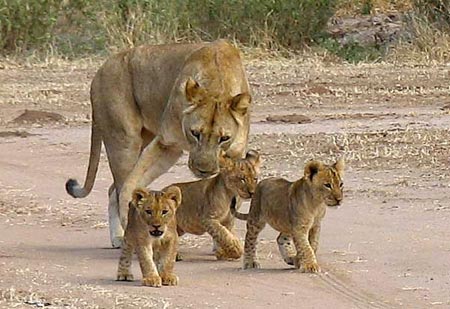Internet is a threat to wild animals
The Internet allows for easy sale, and has become one of the biggest dangers of animals facing the threat of extinction.

The internet is helping effectively trade protected species on a global scale.Photo: wildlife-pictures-online.com.
The BBC said that in a conference of 175 countries participating in the Convention on International Trade in Endangered Species (CITES) in Doha, Qatar, conservationists affirmed that buying and selling wildlife is becoming increasingly popular. It should be easier thanks to online auction sites and chatrooms.
'The Internet is becoming a key factor for global trade in protected species , ' AP quoted Paul Todd, director of the International Animal Relief Fund.
Todd said thousands of endangered animals and plants are being bought and sold regularly on the Internet - a tool that helps them anonymously easily and at the same time be able to deal with others around the world. gender.
Conservation organizations recognize the size of the online wildlife trade market so large that they are almost impossible to calculate. According to them, the US is the largest market, but Europe, China, Russia and Australia also play an important role.
AP said that the International Animal Relief Fund (IFAW) has conducted many surveys on the status of wildlife trade on hundreds of websites. A three-month investigation in 2008 showed that more than 7,000 species were auctioned online. African ivory is the most auctioned. Rare birds, polar bear hides and snow leopard, tiger bone wine are also among the most traded items.
"Because the Internet has no borders, it creates many difficulties for protecting animals in danger," the IFAW report stated.
The IFAW survey found that the Ebay ban on ivory trading has made the ivory sales drop. Earlier, the International Animal Relief Fund said that EBay was one of the most ivory-traded sites.
Some websites in the United States have built a zoo online to provide all animals, from falcons, primates to giraffes. They sold a newborn zebra for about $ 3,500. Some of these websites also claim they can provide endangered animals and delivery.
Another survey in Ecuador conducted in 2009 by the Campaign Against the Cruelty to Animals revealed many sites offering live animals such as baby lions, wild cats and capuchins.
John Stellar, official overseeing the implementation of the Convention on Endangered Wildlife Trade, said the impact of the Internet on wildlife trade is being exaggerated. He said that many animal vendors do not want to trade over the Internet because police can find their whereabouts through payment operations. In addition, the police can also impersonate buyers to break the illegal trafficking networks.
- Photography: 'Talking eyes' of wild animals
- American wild boar 'invades' Mexico
- 'Domain kiting' - New threat on the Internet
- 7 differences between animals and wild animals
- Why did Australia destroy 2 million cats?
- Fascinating wild dogs with lovely looks, personality like wolves
- Strange tragedy of children living with wild animals
- DNA testing for wild dogs suddenly discovered the rare animals on the planet
- Mysterious children are raised by wild animals
- See pictures of migrant animals
- 7 species of wild animals are being eradicated by humans
- Kangaroo roars with wild dogs
 Is the magnetic North Pole shift dangerous to humanity?
Is the magnetic North Pole shift dangerous to humanity? Washington legalizes the recycling of human bodies into fertilizer
Washington legalizes the recycling of human bodies into fertilizer Lightning stone - the mysterious guest
Lightning stone - the mysterious guest Stunned by the mysterious sunset, strange appearance
Stunned by the mysterious sunset, strange appearance